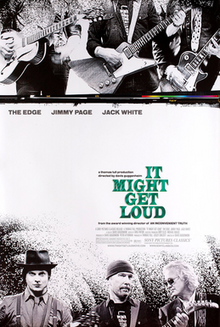It Might Get Loud
| It Might Get Loud | |
|---|---|

Film poster
|
|
| Directed by | Davis Guggenheim |
| Produced by |
Thomas Tull Davis Guggenheim Lesley Chilcott Peter Afterman Jimmy Page |
| Starring |
Jimmy Page The Edge Jack White |
| Music by | Jimmy Page The Edge Jack White |
| Cinematography | Erich Roland Guillermo Navarro |
| Edited by | Greg Finton |
|
Production
company |
Steel Curtain Pictures
|
| Distributed by | Sony Pictures Classics |
|
Release date
|
|
| Country | United States |
| Language | English |
| Box office | $1,807,506 |
| Professional ratings | |
|---|---|
| Aggregate scores | |
| Source | Rating |
| Metacritic | 70/100 |
| Review scores | |
| Source | Rating |
| Classic Rock | |
| Mojo | |
| Uncut | |
It Might Get Loud is a 2008 American documentary film by filmmaker Davis Guggenheim. It explores the careers and styles of prominent rock musicians Jimmy Page, The Edge, and Jack White. The film received a wide release on August 14, 2009 in the U.S. by Sony Pictures Classics.
The film documents the varied playing and recording styles of guitarists Jimmy Page, The Edge, and Jack White.
Page's history with guitar traces back to his childhood when he played in a skiffle band. After desiring to do more than play pop music, Page "retires" from guitar playing to attend art school. He later revives his music career as a session guitarist, only to be discouraged by the realization that he is playing others' music and stifling his own creativity. At that point, Page begins to write and perform in the bands The Yardbirds and Led Zeppelin. Page discusses the skiffle and blues music that influenced him at the time. For many of Page's scenes, he is seen visiting Headley Grange, where several songs from Led Zeppelin IV were recorded, and in one scene, explains how the distinctive drum sound from "When the Levee Breaks" was achieved from the acoustics of the house in which it was recorded.
The Edge's history with guitar traces back to building a guitar with his brother Dik and learning to play. In the film, he visits Mount Temple Comprehensive School and recalls forming U2 in his childhood. He also demonstrates his playing technique, in how he eliminates certain strings from chords, as well as his use of echo and delay effects to "fill in notes that aren't there". He also discusses his purchase of his signature guitar, the Gibson Explorer, in New York City and the punk music that influenced him. In other scenes, he plays early demo tapes of "Where the Streets Have No Name", discusses his inspiration for "Sunday Bloody Sunday", and spends time experimenting with guitar effects for the riffs to "Get on Your Boots".
...
Wikipedia
